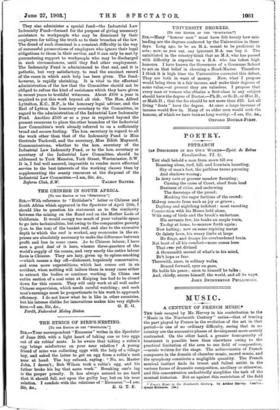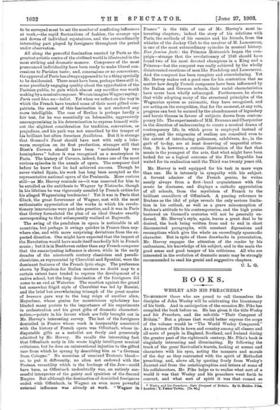M USIC.
A CENTURY OF FRENCH MUSIC.* THE task essayed by Mr. Hervey in his contribution to the "Music in the Nineteenth Century" series—that of tracing the part played by France in the evolution of the art in that period—is one of no ordinary difficulty, seeing that in no country are the successive phases of development more acutely contrasted. On the other hand, a greater homogeneity of treatment is possible here than elsewhere owing to the practical limitation of the area to one field of composition, —music written for the stage. The achievements of French composers in the domain of chamber music, sacred music, and the symphony constitute a negligible quantity. The French musical instinct finds its truest and fullest outlet in the various forms of dramatic composition, ancillary or otherwise, and this concentration undoubtedly simplifies the task of tho musical historian. But as against this restriction of the field NIntteenth Century. By Arthnt Hervey. Lowion :
• l'rench Music in the
to be surveyed must be set the number of conflicting influences at work,—the rapid fluctuations of fashion, the strange ups and downs of individual reputations, and the extraordinarily interesting part played by foreigners throughout the period under observation.
All along the powerful fascination exerted by Paris as the greatest artistic centre of the civilised world is illustrated in the most striking and dramatic manner. Composers of the most pronounced individuality have been ready to make liberal con- cessions to Parisian taste; and, concessions or no concessions, the approval of Paris has always appeared to be a thing specially to be desiderated. There must have been, perhaps there still is, some peculiarly engaging quality about the approbation of the Parisian public, to gain which almost any sacrifice was worth making by a musical composer. We can imagine Wagner saying: Paris rant biers un—ballet. Yet when we reflect on the way in which the French have treated some of their most gifted com- patriots, the secret of this fascination is not rendered any more intelligible. The case of Berlioz is perhaps hardly a fair test, for he was essentially an Ishmaelite, aggressively uncompromising in his determination to express himself with- out the slightest consideration for tradition, convention, or prejudices, and his path was not smoothed by the temper of his brilliant but often ferocious feuilletons. But it is strange that Gounod's Faust should have met with only a luke- warm reception on its first production, stranger still that Bizet's Carmen should have been " acclaimed by two hemispheres" before it was recognised as a masterpiece in Paris. The history of Carmen, indeed, forms one of the most curious episodes in the annals of opera. The composer died before he knew that he had achieved success. Though he never visited Spain, his work has long been accepted as the representative national opera of the Peninsula. More curious still—as Mr. Hervey reminds us—it was reserved for him to be extolled as the antithesis to Wagner by Nietzsche, though in his lifetime he was vigorously assailed by French critics for his alleged Wagnerising tendencies ! Yet it was in Paris that Gluck, the great forerunner of Wagner, met with the most enthusiastic appreciation of the works in which his revolu- tionary innovations were put into practice, and it was in Paris that Gretry formulated the plan of an ideal theatre exactly corresponding to that subsequently realised at Bayreuth.
The swing of the pendulum in opera is noticeable in all countries, but perhaps it swings quicker in France than any- where else, and with more surprising deviations from the ex- pected direction. One might have expected that the impact of the Revolution would have made itself markedly felt in French music ; but it is in Beethoven rather than any French composer that the emancipating influence is shown, while in the early decades of the nineteenth century classicism and pseudo- classicism, as represented by Cherubini and Spontini, were the dominant features of the French lyric stage. The preference shown by Napoleon for Italian masters no doubt may to a certain extent have tended to repress the development of a native school, but the long domination of the foreigners did come to an end at Waterloo. The reaction against the grand but somewhat frigid style of Cherubini was led by Rossini, and the brief but overwhelming triumph of the great master of bravura gave way to the long reign of another alien, Meyerbeer, whose genius for meretricious upholstery has blinded many purists to the importance of his experiments in orchestration and his great gifts of dramatic characteri- sation,—points in his favour which are fully brought out in Mr. Hervey's interesting survey. The last of the foreigners domiciled in France whose work is inseparably associated with the history of French opera was Offenbach, whose in- disputable gifts as a melodist are freely and generously admitted by Mr. Hervey. He recalls the interesting fact that Offenbach early in life wrote highly intelligent musical criticisms, but he does an unintentional injustice to the gifted race from which he sprang by describing him as " a German from Cologne." No musician of unmixed Teutonic blood— or, to put it differently, no alien not endowed with the Protean versatility which is the heritage of the Jew—could have been, as Offenbach undoubtedly was, an entirely suc- cessful interpreter of the gaiety and cynicism of the Second Empire. But although the domination of domiciled foreigners ended with Offenbach, in Wagner an even more powerful external influence was already at work. " Wagner in
France " is the title of one of Mr. Hervey's most in- teresting chapters; indeed the story of his relations with Paris, the methods of his enemies and his friends, from the whistles of the Jockey Club to the revolver of M. Lamoureux, is one of the most extraordinary episodes in musical history. Duz femina facli : the Princess Metternich began the cam- paign—strange that the revolutionary of 1848 should have found two of his most devoted champions in a King and a Princess—but the conquest was really achieved by the wholly disinterested exertions of men like Pasdeloup and Lamoureux. And the conquest has been complete and overwhelming. Yet Mr. Hervey makes out a good case for his contention that no matter how deeply French composers have been influenced by the Italian and German schools, their racial. characteristics have never been wholly submerged. Furthermore, he shows that while adopting many of the structural principles of the Wagnerian system as axiomatic, they have recognised, and are acting on the recognition, that for the moment, at any rate, progress can best be secured by the abandonment of legendary and heroic themes in favour of subjects drawn from contem- porary life. The experiments of MM. Bruneau and Charpentier in the direction of endeavouring to create a musical drama of contemporary life, in which prose is employed instead of poetry, and the exigencies of realism are consulted even to the extent of introducing policemen, cabdrivers, &c., in the garb of to-day, are at least deserving of respectful atten- tion. It is, however, a curious illustration of the fact that music is the youngest of the arts, that what might have been looked for as a logical outcome of the First Republic has waited for its realisation until the Third was twenty years old.
Mr. Hervey is well equipped for his task in more ways than one. He is intensely in sympathy with his subject. A fervent admirer of the French genius, he writes nearly always from a first - hand acquaintance with the music he discusses, and displays a catholic appreciation of all schools, from the mysticism of Franck to the brilliant canaillerie of Offenbach. A passing reference to Brahma as the idol of prigs reveals the only serious limita- tion in his outlook, as well as a grave misconception of Brahms's attitude to his contemporaries, and the high praise bestowed on Gonnod's oratorios will not be generally en- dorsed. Mr. Hervey's style, again, leaves a great deal to be desired, the book being written from end to end in short disconnected paragraphs, with constant digressions ' and resumptions which give the whole an exceedingly spasmodic character. But in spite of these drawbacks in presentation, Mr. Hervey engages the attention of the reader by his enthusiasm, his knowledge of his subject, and in the main the good sense and good temper of his criticisms. All who are interested in the evolution of dramatic music may be strongly recommended to read his genial and suggestive chapters.
C. L. G.























































 Previous page
Previous page